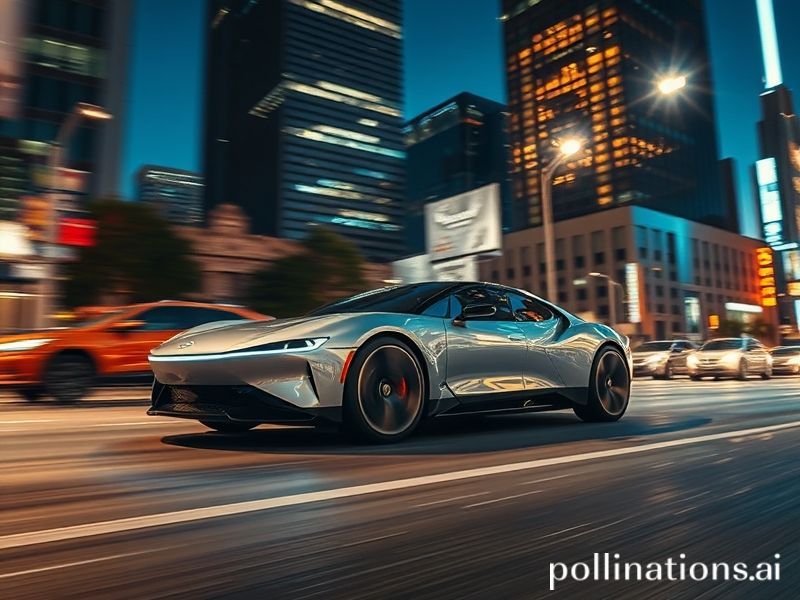Lucid Air Goes Global: The Six-Figure Electric Mirage Now Shipping to Guilty Consciences Worldwide
Lucid Motors—Silicon Valley’s latest attempt to make batteries sexy—has finally started shipping its Air sedans to customers who apparently believe that paying six figures for the privilege of explaining “No, it’s not a Tesla” is a personality. From Riyadh showrooms to Rotterdam harbors, the Lucid Air is gliding onto roads just in time for a planet that can’t decide whether it wants to ban cars or build more of them.
The car itself is a marvel: 1,111 horsepower, 0-to-60 in the time it takes to regret your mortgage, and an EPA-certified 516-mile range—enough to outrun most existential crises on a single charge. Yet the real spectacle isn’t the engineering; it’s the geopolitical theater unfolding in the back seat. Lucid’s largest shareholder is Saudi Arabia’s Public Investment Fund, which means every silent, zero-emission mile driven in California is partially underwritten by the same kingdom that still sells an ocean of oil every day. Nothing says “energy transition” quite like a theocracy hedging its bets.
In China, where EV adoption curves look like 2021 crypto charts, Lucid’s plans remain aspirational. The firm recently inked a memorandum of understanding with Astonishingly Rapid Industrial Park #47 (not its real name, but close enough) to build a factory that will—if local bureaucrats don’t change their minds over dim sum—crank out “Made in China, Exported to People Who’d Rather Not Ask Questions” models by 2025. Beijing’s calculus is simple: import the prestige, harvest the patents, and then politely forget the foreign brand ever existed. It’s the same courtship dance Western firms have been doing since Marco Polo, albeit with better NDAs.
Europe, meanwhile, greets Lucid with all the warmth of a customs officer discovering undeclared cheese. Brussels has drafted yet another regulation—surely the 73rd this fiscal quarter—requiring battery passports that detail every ounce of cobalt’s life story, including whether it ever shared a dorm room with child labor. Lucid insists its supply chain is “audited to extinction,” a phrase that would be more reassuring if auditors hadn’t also certified several banks that no longer exist. Still, Nordic governments are dangling purchase incentives hefty enough to make even stoic Lutherans consider splurging on the Dream Edition. After all, nothing screams social democracy like a tax credit for a car that costs more than the average citizen earns in a decade.
Back in the United States, Lucid’s factory in Arizona rises like a glass-and-steel mirage amid the cacti, promising 7,500 jobs or roughly one lobbyist per assembly-line robot. Local officials cheer the “green renaissance” while quietly praying the water table holds out long enough for their term limits to kick in. Consumers, for their part, are divided: coastal elites view the Air as the final boss of virtue signaling, while heartland pickup drivers see it as a very expensive toaster that can’t even tow a bass boat. Both camps agree on one thing—watching the charging-time estimator creep upward is the closest modern analogue to medieval purgatory.
The broader significance? Lucid is less a car company than a Rorschach test for late-stage capitalism. To climate optimists, it’s proof that innovation and lucre can still tango. To cynics (hello, dear reader), it’s another luxury bauble that swaps tailpipe emissions for lithium brine pits, cobalt dust, and weekend think-pieces about inequality. Either way, the Air is now circling runways from Doha to Düsseldorf, a silent ambassador for a world racing to electrify before the ice caps finish their farewell tour.
And so we glide forward, 500-plus miles at a time, powered by lithium, funded by petrodollars, and justified by PowerPoint slides promising net-zero by 2050—give or take a civilization. Buckle up; the future is fully charged, morally murky, and available in matte black for an extra $4,000.







